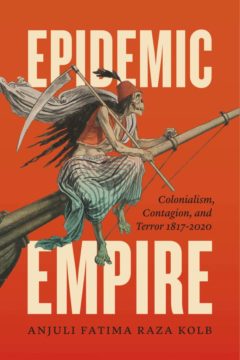Tarek Younis in the LSE Review of Books:
 The timing of Anjuli Fatima Raza Kolb’s Epidemic Empire is opportune, not just because her discussion of epidemics strikes a chord in our post-COVID era. Rather, it is the book’s ability to communicate the significance of epidemics for national security, exposing that thin line which divides the virus in the body from the body as a virus.
The timing of Anjuli Fatima Raza Kolb’s Epidemic Empire is opportune, not just because her discussion of epidemics strikes a chord in our post-COVID era. Rather, it is the book’s ability to communicate the significance of epidemics for national security, exposing that thin line which divides the virus in the body from the body as a virus.
Certainly, some bodies are conceived of as viruses more than others. From various colonial administrations across history to the contemporary ‘War on Terror’, Raza Kolb traces the Global North’s reliance on illness metaphors in making sense of and managing racialised (post-)colonial subjects. Epidemics play a central rhetorical device in this regard. And while contemporary security practices are replete with medical metaphors, Raza Kolb charts their legacy across (post-)colonial history.
Raza Kolb draws significantly on Edward Said’s mode of recognising Orientalism’s discursive construction of Islam and Muslims as regressive, savage and — as central to the book — toxic. Epidemic Empire thus draws primarily on written texts and literary works to build a convincing argument about the historical significance of illness metaphors.
More here.
